Desi ghee is Clarified Butter. It has almost all the qualities of butter and after reading the researches it seems Ghee is having better nutrition value and self-life than butter. Actually, many ancient stories tell us the origin of Ghee is due to the Shelf life of Butter. Since the butter has very less shelf life, people started making Ghee to enjoy the buttery taste with their food. Over a period of time, Ayurveda described the medicational properties of Desi Ghee, Specially Desi Cow milk Ghee. Soon after they discovered rejunivating therapies, Ghee became an integral part of Ayurveda Healing. Because of its transportable qualities, ghee has been in demand since centuries for using as medicine with other herbs.
This may be one of the most-asked questions involving ghee: Is desi ghee better than butter? It depends on how one considers the notion of being “better,” but there are definitely a variety of reasons to use desi ghee instead of butter, especially if you have problems consuming dairy products.
So how is ghee better than butter? Ghee has a unique nutrition profile without any lactose or casein, but rich in short-chain and medium-chain fatty acids and butyrate. For people who are lactose or casein-sensitive, they can use ghee because the process has removed these allergens. If you’ve been told to stay away from dairy and butter, experiment with ghee made from grass-fed cow!
Butter contains 12-15 percent medium and short-chain fatty acids, while ghee contains 25 percent or greater. The body actually metabolizes these fats in a different manner than long-chain fatty acids. The result? Medium and short chains are not associated with cardiovascular disease.
Ghee is produced by clarifying butter. This is done by melting regular butter until it separates into liquid fats & milk solids. Once this separation occurs, the milk solids are removed, and the resulting product is pure ghee. Taking away the milk solids means that pure ghee has less lactose and casein than butter does, making it easier to digest for people who have shown signs of intolerance to dairy.
A deeper look into lactose and casein
Lactose & casein are two of the biggest problem-causing components in dairy, and their presence in food can lead to allergies and sensitivities.
Casein is the most-common protein in mammalian milk, accounting for approximately 80% of proteins in cow’s milk. People can have allergies to casein; experiencing hives, breathing problems, rashes, or pain in the gut and abdomen when the protein is consumed.
People who are lactose intolerant experience digestive problems after consuming dairy products. According to a study, entitled The acceptability of milk & milk products in populations with a high prevalence of lactose intolerance, nearly 75% of the world’s population is impacted by some level of lactose intolerance.
Lactose intolerance often develops in people because of their small intestine’s inability to produce enough of an enzyme known as lactase. Lactase is responsible for digesting lactose, which is a form of milk sugar. When deficient levels of lactase are produced, the undigested dairy products move on from the small intestine to the colon. This can lead to undesirable symptoms of lactose intolerance, including bloating, stomach pain, gas, diarrhea, or constipation.
Is desi ghee better than butter for cooking?
If you are cooking at high temperatures, or are prone to burning the food you prepare, desi ghee may be a better option than butter for cooking.
Butter begins to smoke at 350°F (177°C). On the other hand, ghee smoking point is around 482 °F (250 °C). That means you have about 135°F between the two burning points.
If you sauté or fry a lot of foods, then using desi ghee will help you do so without burning your food.

Desi Ghee is better than butter if you have sensitivities to dairy, or you cook at high temperatures
Desi Ghee and butter are fairly similar from a nutritional value standpoint. However, for people who are lactose intolerant or have a sensitivity to casein, desi ghee is a better option because it lacks the milk proteins that cause so many people’s digestive issues.
Furthermore, desi ghee is a superior cooking oil for anyone that uses high temperatures, or is prone to accidentally burning their meals.
Rich Flavor
Ghee has a rich, sweet & deliciously nutty flavor. A little amount of desi ghee adds a lot of flavor to the food. One tablespoon of desi ghee can replace up to three tablespoons of oil or butter in your recipe.
Alkalizing Effect
Pure ghee has slightly alkalizing effect on the body whereas butter has a slightly acidifying effect.
Ayurvedic Usage
A ghee which has been properly washed according to Ayurvedic specifications is very beneficial in healing the skin. A small amount of desi ghee applied to belly button nourishes the entire body and is especially helpful is healing dried lips. Ghee is widely used in Ayurvedic massages & supplements. Ghee is sattvic food whereas butter is tamasic. Also, butter increases Kapha whereas ghee balances all the 3 doshas (kapha should use it in moderation).
Uses of ghee & butter : Butter consists of a natural smoke point making it a fine option for cooking and baking. Due to its sweet, creamy taste, butter can be chosen over ghee in recipes with mild flavors whereas ghee provides more moisture as compared to butter, in such case one may require to adjust the recipes when alternating ghee for butter while cooking.
Versatility of ghee and butter : Considering an alternative for digestibility, use ghee in place of butter on warm steamed vegetables or as a spread on toast during breakfast. A versatile option like gee can be swapped with butter at an equal ratio when cooking and baking. During cooking if a recipe requires 2 teaspoons of butter, use 2 teaspoons of ghee if possible.
Smoke Point : Research has shown that ghee has a smoke point of somewhere around 482 degrees F, much higher as compared to butter’s smoke point of 350 degrees F which is suitable for high-heat cooking, such as deep frying, grilling, roasting and broiling.
Less Acrylamide : Even though ghee has a high smoking point, research has proven that ghee produces less acrylamide which is a toxic compound that can form in foods during high-heat cooking which is the case in cooking oils when heated. Whereas further research is required, studies have suggested that high doses of acrylamide may trigger the risk of cancer causing cells.
Nutritional Value : Even though butter and ghee consist of almost equal nutrient compositions but still the two have some differences. As compared to per teaspoon, ghee is higher in calories and fat as compared to butter. Ghee is slightly higher in vitamin A, a fat-soluble vitamin essential for vision, immunity, growth, development, reproduction and mental stability.
Read our blog – Why The Pure Desi Cow Milk Ghee Is Costlier Than Normal Ghee?
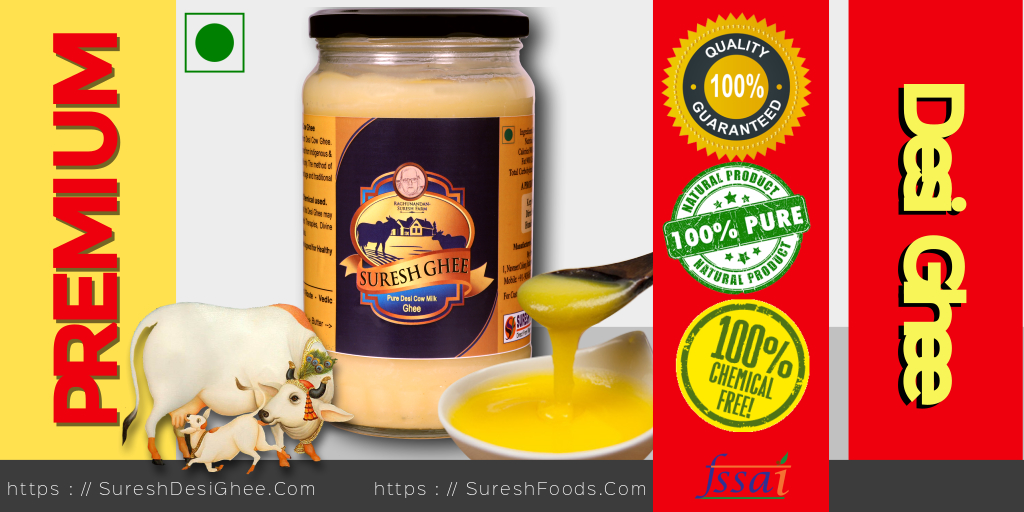

- It helps in reducing any inflammation or swelling, redness, and itchiness on a skin and also helps to slow down your aging process. Massage little amount of warm desi ghee on the affected joints. This will reduce the pain and swelling.
- Ghee is rich in carotenoids and vitamin A and Intake of clarified butter increases or boosts the antioxidants in your body thus promoting cell growth, increasing immunity, improved vision and also reduces the risk of cancers and heart diseases.
- It is very useful in skin problems also. Take little amount of desi ghee and massage the affected areas with it regularly. After 2-3 hrs. of massaging take a shower preferably use sandalwood or neem soap.
- When you suffer from oral ulcers and cannot bear its burning sensation then cure it using ghee. Apply a moderate quantity of desi ghee on the ulcer. This will help to reduce the burning sensation & also heal ulcer fast.
- To regain the strength and immunity after fever, ghee is favorable. Ghee helps to bring back the power after your body is cured of illnesses. Take a little quantity of it and add it to diet.
Tips for using Ghee
- Always consider desi ghee before making any recipe and how it can enhance its taste.
- Always use a clean spoon whenever you take this out from the jar to make sure that it stays good for a long time.
- Store your desi ghee in a tightly closed container and a dark place.
- Melt it first & then adds spices and other ingredients. It will enhance the aroma & taste of the spices.
- Ghee is always healthier to sauté your spices, first seeds and then your ground spices. Aromatic and healthy properties of the seeds and spices are released at this point.
Shelf Stable
A well-prepared ghee has very little moisture content and it is very shelf-stable. You do not need to refrigerate it for 3-4 months if you keep it in an airtight container. When kept in a refrigerator, pure ghee can last up to a year. In India, aged ghee is considered to have healing properties & some families have ghee that is over 100-years old. The aged ghee is used externally for therapeutic purposes, and only under the care of an experienced physician.

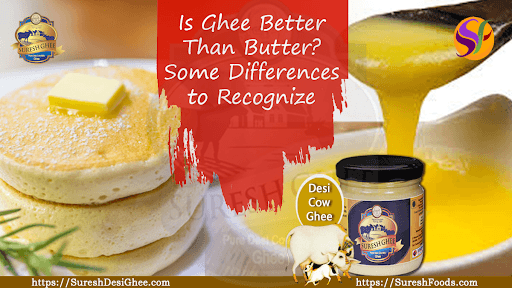
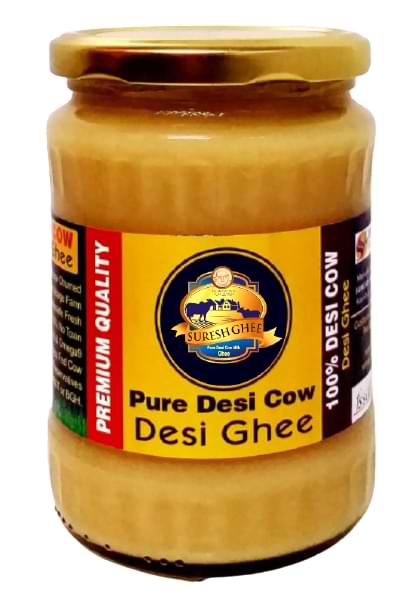
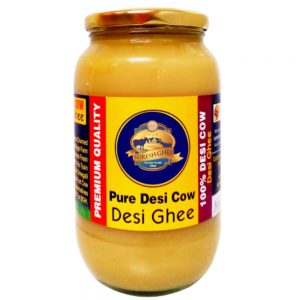
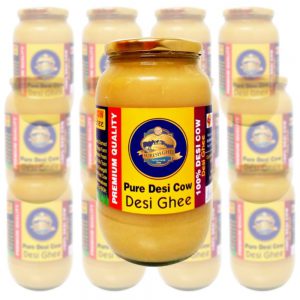
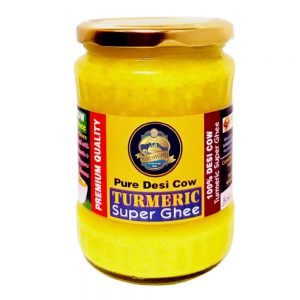
 WhatsApp us
WhatsApp us 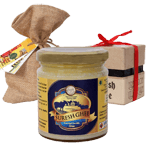
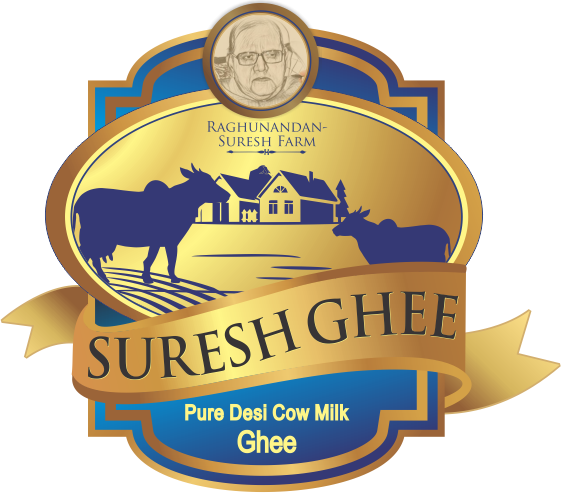
Naveen m...